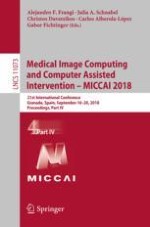2018 | OriginalPaper | Buchkapitel
Training Multi-organ Segmentation Networks with Sample Selection by Relaxed Upper Confident Bound
verfasst von : Yan Wang, Yuyin Zhou, Peng Tang, Wei Shen, Elliot K. Fishman, Alan L. Yuille
Erschienen in: Medical Image Computing and Computer Assisted Intervention – MICCAI 2018
Aktivieren Sie unsere intelligente Suche, um passende Fachinhalte oder Patente zu finden.
Wählen Sie Textabschnitte aus um mit Künstlicher Intelligenz passenden Patente zu finden. powered by
Markieren Sie Textabschnitte, um KI-gestützt weitere passende Inhalte zu finden. powered by
